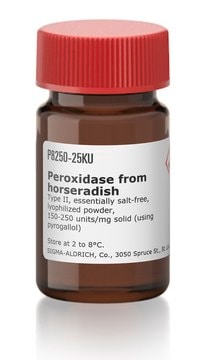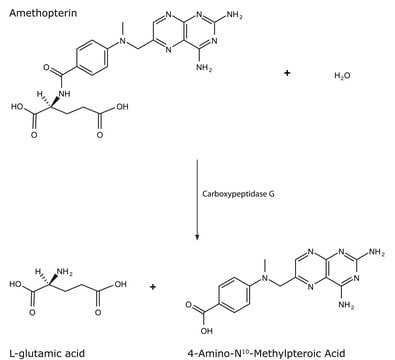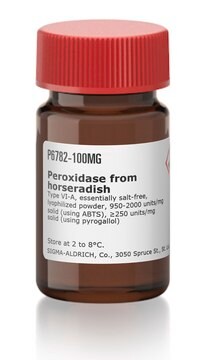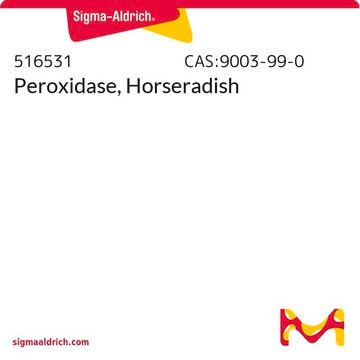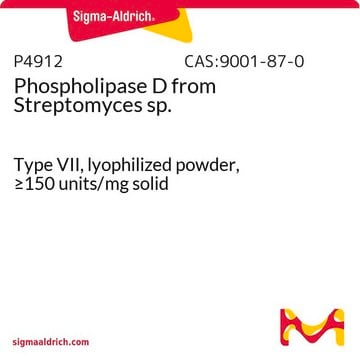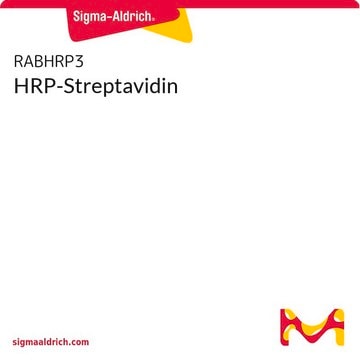V900503
Peroxidase from horseradish
Vetec™, reagent grade
Synonym(s):
Donor:hydrogen-peroxide oxidoreductase, Horseradish peroxidase
Sign Into View Organizational & Contract Pricing
All Photos(1)
About This Item
Recommended Products
grade
reagent grade
product line
Vetec™
form
powder
specific activity
≥250 units/mg solid
mol wt
~44 kDa
storage temp.
2-8°C
InChI
1S/H2O3/c1-3-2/h1-2H
InChI key
JSPLKZUTYZBBKA-UHFFFAOYSA-N
Looking for similar products? Visit Product Comparison Guide
General description
Horseradish peroxidase is isolated from horseradish roots (Amoracia rusticana) and belongs to the ferroprotoporphyrin group of peroxidases. HRP is a single chain polypeptide containing four disulfide bridges. It is a glycoprotein containing 18% carbohydrate. The carbohydrate composition consists of galactose, arabinose, xylose, fucose, mannose, mannosamine, and galactosamine depending upon the specific isozyme. Its molecular weight (~44 kDa) includes the polypeptide chain (33,890 Daltons), hemin plus Ca2+ (~700 Daltons), and carbohydrate (~9,400 Daltons). At least seven isozymes of HRP exist. The isoelectric point for horseradish peroxidase isozymes ranges from 3.0 - 9.0.
Unit Definition
One pyrogallol unit will form 1.0 mg purpurogallin from pyrogallol in 20 sec at pH 6.0 at 20 °C.
Analysis Note
The RZ (Reinheitszahl) is the absorbance ratio A403/A275 determined at 0.5-1.0 mg/ml in deionized water. It is a measure of hemin content, not enzymatic activity. Even preparations with high RZ may have low enzymatic activity.
Other Notes
View more information on peroxidase at www.sigma-aldrich.com/enzymeexplorer.
Legal Information
Vetec is a trademark of Merck KGaA, Darmstadt, Germany
Signal Word
Danger
Hazard Statements
Precautionary Statements
Hazard Classifications
Resp. Sens. 1
Storage Class Code
11 - Combustible Solids
WGK
WGK 1
Certificates of Analysis (COA)
Search for Certificates of Analysis (COA) by entering the products Lot/Batch Number. Lot and Batch Numbers can be found on a product’s label following the words ‘Lot’ or ‘Batch’.
Already Own This Product?
Find documentation for the products that you have recently purchased in the Document Library.
Customers Also Viewed
Wen Liu et al.
Biochemical pharmacology, 85(10), 1504-1512 (2013-03-20)
NLRP3 inflammasome has been reported to be associated with various kinds of immunological diseases including colitis. However, there are few drug candidates targeting inflammasomes for the treatment of colitis. In the present study, we aimed at examining the effect of
George A Kastis et al.
Experimental biology and medicine (Maywood, N.J.), 238(2), 209-222 (2013-04-12)
Intratracheal administration of lipopolysaccharide (LPS) in animals is a commonly used model of acute lung injury, characterized by increased alveolar-capillary membrane permeability causing protein-rich edema, inflammation, deterioration of lung mechanical function and impaired gas exchange. Technetium-99-m-labeled diethylene-triamine pentaacetatic acid ((99m)Tc-DTPA)
Naping Tang et al.
Gene, 523(2), 152-157 (2013-04-16)
Published data on the association between the myeloperoxidase (MPO) G-463A polymorphism and coronary artery disease (CAD) are inconclusive. To derive a more precise estimation of the relationship, a meta-analysis on this topic was performed. PubMed, EMBASE and Chinese national knowledge
Ting-Yuan David Cheng et al.
American journal of epidemiology, 177(10), 1106-1117 (2013-03-29)
The authors investigated associations of serum phospholipid n-3 and n-6 polyunsaturated fatty acids (PUFAs) and trans-fatty acids with prostate cancer risk, and whether myeloperoxidase G-463A (rs2333227) modified the associations in the Carotene and Retinol Efficacy Trial (CARET) (Seattle, Washington; Irvine
Marie Thérèse Droy-Lefaix et al.
Investigative ophthalmology & visual science, 54(4), 2705-2710 (2013-03-23)
The aim of this study was to evaluate the interest of an ophthalmic eyedrop preparation containing a myosin light chain kinase (MLCK) inhibitor, ML-7, in the treatment of ocular surface. The local protective effect on the inflammation and the increase
Our team of scientists has experience in all areas of research including Life Science, Material Science, Chemical Synthesis, Chromatography, Analytical and many others.
Contact Technical Service



